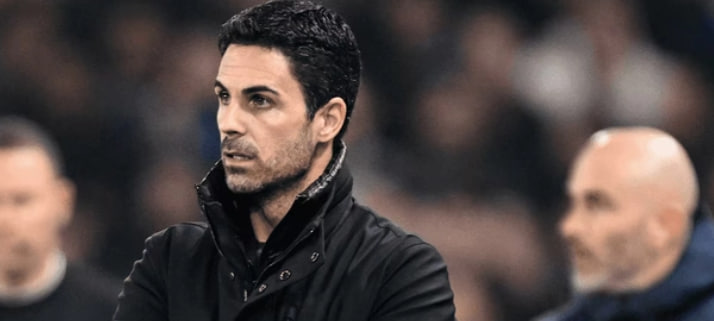If you are a long-time fan of the Premier League, then you must be familiar with Arsenal. It is not the richest club, nor is it the team that has won the most championships in recent years, but it has always had its own unique character. And this character has been slowly shaped over the past few years by a former player—the current head coach, Mikel Arteta.
Arteta was never an ordinary player during his playing days. He was always a thinker on the field, constantly analyzing how to play the game and how to help his teammates improve. Now as a coach, his style hasn’t changed—it’s become even more distinct. Many veteran players have said that the things he says and does in the locker room sometimes have little to do with football itself, but they have a huge impact on the team.

Former Arsenal forward Theo Walcott is a prime example. In an interview, he said, “Mikel Arteta isn’t just about tactics and training. He also likes to talk about other things, like mental state and teamwork—topics that don’t seem very ‘football-related.’”
Sounds a bit strange? Actually, this is what makes Arteta special. He believes that to play well, it’s not enough to just have technical skills; you also need brains and spirit. Let’s look at a few examples to see how he has changed Arsenal step by step.
1. Not just playing football, but learning how to be a person
Arteta often arranges “non-football” courses for his players. For example, he once invited a psychologist to give a lecture on how to stay calm under pressure.
This is relatively uncommon in the Premier League, as most coaches prefer to spend their time on the training ground rather than having their players sit down and listen to lectures. But Arteta believes that mental strength is just as important as performance on the pitch.He once said, “If your mind is a mess, no matter how good your body is, you won’t be able to play well.”
Therefore, he hopes to help players build stronger mental fortitude through these methods. The results? It has indeed been effective. Many players have said that they are able to handle situations more calmly during games and are less likely to panic when facing strong opponents.
2. The atmosphere in the locker room has changed
Whether a team can win games depends not only on technical skills and tactics but also on a crucial factor: the atmosphere in the locker room. If players don’t get along and act independently, even the most talented coach can’t lead them to victory.
Arteta put a lot of effort into this. Not only did he organize team-building activities, but he also took the opportunity to chat with the players before and after training to understand their thoughts. Once, he even kept the entire team in the locker room before training and gave a long speech.
The content of that speech was not made public, but according to Walcott, it was very effective.He said, “After that speech, the whole team felt different. Everyone was more motivated, as if we suddenly understood what we were supposed to do.”
This approach may seem a bit like “chicken soup,” but it is actually very useful. It makes players feel a sense of belonging and mission, rather than just thinking about scoring goals or showing off.
3. A speech changed the fate of the season
One year, Arsenal was in a slump. The players were demoralized, and coach Wenger was trying to make adjustments, but nothing seemed to work. At that moment, Arteta stepped up.
He gathered the entire team and gave a speech in the locker room. He didn’t criticize or blame anyone, but instead spoke from a team perspective about responsibility, perseverance, and unity.
After listening, the players felt warmed in their hearts. They began to realize that they couldn’t always wait for others to motivate them; everyone should contribute their share to the team.
That season, Arsenal made a remarkable turnaround, finishing fourth in the league and returning to the Champions League. Many people said that speech was a turning point and also an important opportunity for Arteta to become a coach in the future.
4. His training methods were also unique
Arteta wasn’t just good at talking; he was also creative in his training. He often designed “unusual” training exercises, such as timed attacks and quick transitions between offense and defense.
These drills may seem simple, but they actually test the players’ reaction speed and decision-making abilities. For example, in a simulated match, Arteta required players to complete an attack within five seconds, or it would be considered a failure. This setup forced everyone to make quick decisions without hesitation.
At first, many players found it difficult to adapt, but after practicing repeatedly, they noticed improvements in their rhythm and decision-making abilities. During matches, they could also respond more quickly to changes made by opponents.
5. The path from player to coach
Arteta did not become a coach overnight. He had already demonstrated strong leadership skills during his playing career. Walcott remembers a time when the team was in a slump and everyone had lost confidence. Arteta gathered everyone together and spoke from the heart.
At that time, Walcott felt that this person would definitely become a coach in the future. This was because he knew how to motivate others and knew what to say at the right time.
Facts proved that Walcott’s eyes were right. After retiring, Arteta quickly entered the coaching profession, first assisting Guardiola at Manchester City, and then returning to Arsenal to officially take up the reins.
6. The combination of experience and youth
After taking over Arsenal, the first thing Arteta did was to restructure the team. He did not blindly pursue youth, but chose a strategy of combining the old and the new.
He retained some veteran players, such as David Luiz, while also bringing in many promising young players. This way, the team had experienced veterans to anchor the team and energetic new faces to charge forward.
The benefits of this combination are obvious: the young players are daring and aggressive, while the veterans are steady and reliable. Together, they greatly enhance the fighting power of the entire team.
7. New season, new hopes
As a veteran of Arsenal, Walcott is also very optimistic about the team’s current state. He said, “I think Arsenal has a chance to do something big this season. They are ready.”
By “ready,” he is not just referring to the players’ physical condition and technical skills, but more importantly, the change in the team’s mentality. Everyone is no longer fighting for themselves, but has truly come together as a team.
The team’s performance in the preseason has confirmed his view. The team’s overall coordination has improved, their defense is more solid, and their offense is more organized. Most importantly, the players seem more determined on the field.
Summary
The arrival of Arteta has indeed brought something different to Arsenal. Not only has he changed the team’s tactics and style of play, but more importantly, he has changed the team’s spirit.
He is not the kind of coach who just shouts slogans, but someone who truly understands each player. He knows when to encourage, when to put pressure on, and when to let everyone try and make mistakes.
It is precisely because of him that Arsenal has gradually emerged from the low point and rediscovered its direction.
Perhaps this season is the moment for the Gunners.

